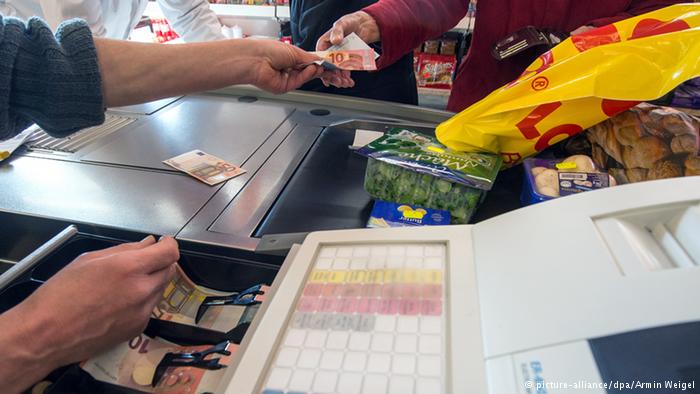Inflation
Falling prices in the Euro area
Good for the consumer – a cause for concern for the European Central Bank: consumer prices fell again. Due to the prices, especially the low energy.

Consumer prices in the Euro area fell for the first time in half a year. The primary reason for this sharp fall in energy prices. As the statistics Agency Eurostat announced on Monday in a preliminary estimate, the cost of living in the 19 countries of the monetary Union in February, by 0.2 percent compared to the previous month. Reason, lower energy costs, which fell by eight per cent, were strong. The 0.5 points less than in January.
The editorial recommends
Inflation targets and distorted images
For years, Inflation in the Euro area is clearly below the mark of two percent, which is targeting the European Central Bank. The ECB is perhaps the wrong target? (28.01.2016)
Oil prices resist Inflation to a halt
Consumer prices in Germany rise more because of cheap energy. Goods and services cost in February, average of as much as a year earlier, the Federal Statistical office. (26.02.2016)
Buying mood continues unabated
Consumers in Germany are still good things. The consumer climate will improve slightly in March, after it had stagnated in February at a high level. (25.02.2016)
Prices in Germany will rise slightly
Inflation in Germany has risen to the beginning of the year. However, it is still a far cry from the almost two percent, targeting the European Central Bank. (28.01.2016)
In February services (1.0 percent), food, alcohol and tobacco (0.7 percent) and industrial goods (0.3 percent) rose in price in the Luxembourg statisticians, though; but the sharply falling energy prices offset these increases completely.
Concern of the ECB
The negative price development surprised analysts, who had expected that February is largely a Zero-Inflation. For Germany, the Federal Statistical office had reported on Friday, an inflation rate of 0 percent.
The European Central Bank (ECB) looks with concern on the tumbling prices, and considers a rate of inflation of just under two percent is considered optimal for the economy. For months, the ECB is trying to bring Inflation back towards its target value. To do this, has launched a programme for the purchase of bonds on a monthly basis, approximately 60 billion euros.
ECB chief Mario Draghi had said in mid-February, the Central Bank will not hesitate to ease monetary policy further, if necessary. Your on 1.5 trillion euros-scale purchase program for bonds and other securities to be running until the end of March 2017. In order for the economy to be stimulated and also the level of Inflation. The next meeting of the Central Bank Council takes place on 10. The end of March.
iw/ (dpa, afp)
